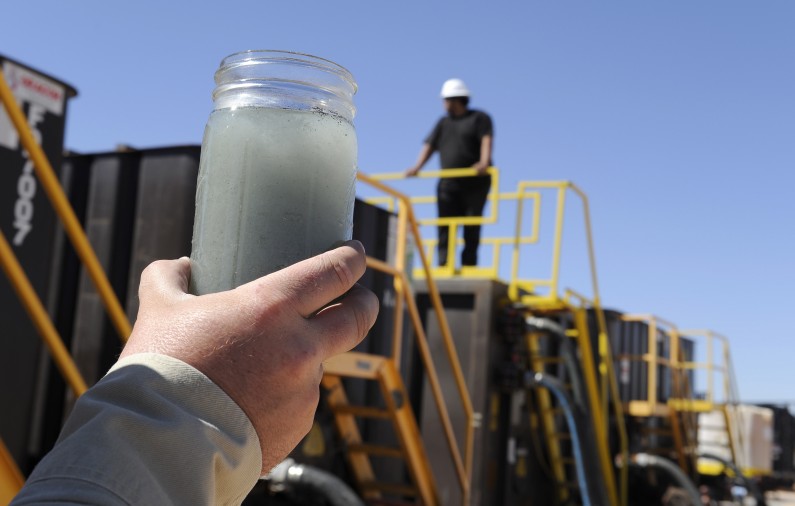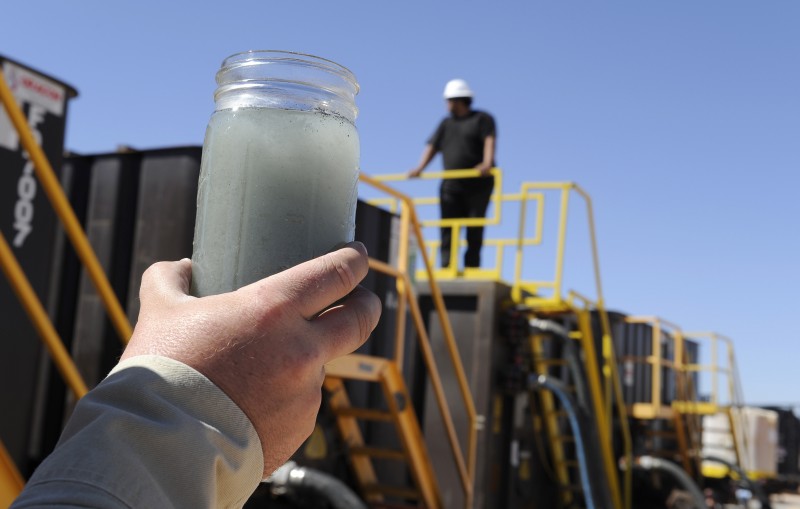
WASHINGTON — Members of the U.S. Congress are formally calling on the Environmental Protection Agency to re-examine reports of groundwater pollution in three states — allegedly, the result of natural gas drilling — and to help affected communities.
EPA investigators have looked into the complaints in Pennsylvania, Texas and Wyoming in recent years. Each of those probes was mysteriously cut short, with the agency failing to take substantive action. Affected landowners and environmental watchdogs have since suggested that the decisions were politically motivated, with directions potentially coming from the White House.
Since failing to get either the companies or the federal government to remedy ongoing contamination problems, several landowners have turned their focus to members of Congress. After months of lobbying, eight Democratic members of the House of Representatives have written a letter to EPA Administrator Gina McCarthy.
“Pavillion, Wyoming, Dimock, Pennsylvania and Parker County, Texas have all experienced the negative impacts of an under regulated drilling industry first hand,” the letter, dated April 1, states.
“Each community was grateful when the EPA stepped in to help deal with their water contamination issues, and disheartened when the EPA stopped their investigations, leaving them with polluted water and little explanation. We are writing to urge you to take any and all steps within your power to help these communities.”
The letter’s lead author is Rep. Matt Cartwright, a member of the House of Representatives who represents Erie, Pa. This is a part of the country that has been particularly transformed in recent years by the new hydraulic fracturing, or “fracking,” technologies that have allowed oil and gas companies to access previously unreachable deposits.
The result has been a transformational glut of domestic production, particularly of natural gas, that has rewritten the energy landscape not just for the United States but, increasingly, for world markets. According to the U.S. Energy Information Agency, by next year U.S. oil production could be higher than any other time in the past four decades.
Unknown impact
According to widespread analysis, though, the U.S. regulatory regime has yet to catch up with these advances. Fracking depends on injecting a huge mass of water, sand and chemicals into each well. This process breaks up geological formations and forces the petroleum products to the surface.
The exact composition of those chemicals remains proprietary information, however, with companies refusing to share this information even with the government. Further, the full ramifications of these high-pressure injections have yet to be fully understood on a local basis, by either company engineers or by local, state or federal government officials.
Some have even suggested that these processes could be leading to increased earthquake activity in certain regions. Others point to a host of medical problems potentially stemming from fracking-related activities, particularly for pregnant women, though the industry continues to deny any connection.
“A patchwork of state regulations, exemptions from many of our federal environment laws and a lack of enforcement have forced communities living in and near to heavily drilled areas to pay the price for this boom,” Rep. Cartwright and the others wrote in their letter.
“Despite the industry’s exemptions from some of our bedrock environmental laws, the EPA does have the power to help ease the burden of directly impacted communities.”
These “exemptions” refer to loopholes created during George W. Bush’s administration that excuse the oil and gas industry from legislation that constitutes some of the EPA’s most powerful regulatory tools, including the Clean Water Act. The oil and gas industry was the only sector to receive such an exemption, and it remains on the books today.
Uniform findings
While the exact mechanics of hydraulic fracturing are not publicly known, far better understood are the increasingly widespread reports by communities located near new drilling sites, complaining of fouled drinking water supplies.
“I used to have a perfectly good water well. But because the government has rolled over and the gas industry won’t deal with our water problems, we now have to truck the water in ourselves,” Ray Kemble, an affected landowner and former gas-worker in Dimock, Pa., told MintPress News.
“All of the neighbors have to chip in and pay the water bill. And this is non-potable water — we also have to buy bottled water on top of everything else, to drink and cook with. That gets expensive.”
In 2012, the EPA agreed to investigate reports of contaminated drinking water on behalf of about a dozen and a half Dimock families living near Cabot Oil and Gas gas drilling sites. The agency appears to have abruptly halted that investigation just months later, and in July of that year, it told residents that their water was safe.
“The sampling and an evaluation of the particular circumstances at each home did not indicate levels of contaminants that would give EPA reason to take further action,” EPA Regional Administrator Shawn M. Garvin said at the time. “Throughout EPA’s work in Dimock, the Agency has used the best available scientific data to provide clarity to Dimock residents and address their concerns about the safety of their drinking water.”
Last year, a document leaked by an EPA whistleblower appeared to suggest otherwise. According to media accounts, the internal report warned that fracking-related activities were causing “significant” damage to local aquifers around Dimock, particularly due to methane seepage.
When Kemble and others have tried to obtain the EPA’s original data from these investigations, however, he said they were stonewalled, with the agency only offering analyses of it findings. But he said EPA investigators have told him off the record that Dimock water is indeed contaminated.
Furthermore, numerous external tests have resulted in fairly uniform findings.
“We’ve gotten private testing done by Duke University, Cornell University, Princeton University, the University of Rochester and others,” Kemble said. “We’ve had every major college testing this water, and they just can’t believe what they’re seeing. And, of course, it keeps getting worse over time.”
Undue influence
Similar EPA investigations in Wyoming and Texas in recent years have also been mysteriously called off.
In Pavillion, Wyo., the agency’s preliminary testing results “indicated that the aquifer was polluted and that this was most likely due to hydraulic fracturing,” Alan Septoff, the communications director at Earthworks, a legal advocacy group that has been closely involved in both the Wyoming and Texas petitions, told MintPress.
“At the point where they were going to put the preliminary results out for peer review, the EPA — in a very odd manner — suddenly withdrew and turned the investigation over to the state and the company that the EPA had identified as responsible for the pollution.”
Septoff said the process was comparable in Parker County, Texas. There, a local man had found his water well to have been contaminated with explosive methane shortly after a company called Range Resources started a nearby fracking operation. The EPA subsequently stepped in and, according to Septoff, found an isotopic match between the methane in the well and that in a Range Resources well.
“Yet again the EPA withdrew under very strange circumstances, basically on the understanding that Range Resources would voluntarily clean up its act,” he noted. “In that case, the EPA inspector general investigated and found that the well had almost certainly been contaminated by Range and that the EPA would have been well within its authority to engage.”
The agency has yet to reopen its investigations in any of these three situations. In response to a query from MintPress following the new letter from members of Congress, the EPA said only that it would “review and respond to the letter appropriately.”
“The oil and gas industry has undue influence over our elected officials, and is able to make it seem politically challenging to take action on this issue,” Emily Wurth, director of the water program at Food & Water Watch, a watchdog group, told MintPress.
“So it’s significant that members of Congress were willing to put forward this request to the EPA and to try to call attention to the fact that people are suffering all over the country. Those people deserve for the EPA to do its job — to look into what’s going on and to try to help people who need clean water to drink.”
Obstructing evidence
For now, it’s unclear what the next step will be. The EPA’s inspector general is currently in the midst of a broad investigation into the agency’s enforcement of oil and gas oversight generally, though no one is sure what to expect from this process.
Earthworks’ Septoff said the Obama administration has made such a priority of what it refers to as an “all of the above” energy strategy that officials are “actively avoiding and obstructing evidence bubbling to the surface indicating there are real problems with fracking-enabled oil and gas drilling.”
Meanwhile, in Dimock, Ray Kemble said his advocacy on the issue has “blacklisted” him, making it almost impossible for him to get work in the area. As unpaid bills mount, he is spending significant time lobbying state and federal officials and touring the country to raise awareness in other states.
“For now, I think there needs to be a full moratorium [on fracking],” he said. “Wherever they’re doing this, you have groundwater contamination and air pollution. If you can’t do it correctly, you shouldn’t be allowed to do it at all.”


